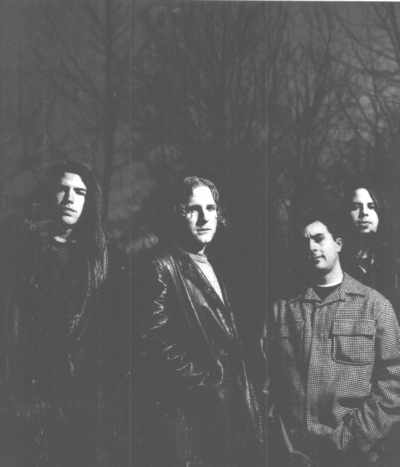
transcribed by Gina Yiu
Seven Mary Three: Cumbersome Combo
by David Sprague
ROLLING STONE
From left: The two Jasons (Pollock and Ross), Khalsa, and Daniel

EVEN THOUGH Seven Mary Three frontman Jason Ross manages to use words like cumbersome, didactic, and superfluous in routine conversation, the 23-year-old singer leaves no doubt that like most foot soldiers in the Hootie Revolution, he’s really just a regular guy. "I think the reason bands like Hootie, Dave Matthews, and, to some degree, ours have done as well as we have is that there’s a work ethic and a willingness to give to the audience," he says. "I can’t deny that there’s satisfaction in seeing 2,000 people out there singing along with something I’ve written, but it’s really not a rock-star trip."
Ross is doing his best to avoid rock star excess. Although Seven Mary Three " named after the call numbers of Larry Wilcox’s unit on the 70’s TV series CHiPs " are scaling the charts with "Cumbersome," the most austere kiss-off song in recent memory, the band members are surprisingly levelheaded. "We don’t sleep on the bus anymore, which I’d say is our first taste of, uh, stardom," says guitarist Jason Pollock. "But we’re not really overindulgent of anything. We like to have fun, but I think we look at what we’re doing as a job."
Ross and Pollock began playing together midway through their junior year at Virginia’s prestigious College of William and Mary, where they received degrees in English and history, respectively. "I’d always kind of wanted to perform, but I was too much of a coward to get onstage," Ross says. "Jason was able to push me into it." The pair began writing songs, and within a few months, they recruited drummer Giti Khalsa and bassist Casey Daniel to fill out the band.
Sidestepping the lucrative but limiting frat-party circuit, Seven Mary Three consciously avoided padding their sets with covers. The quartet gradually developed a following both at home and in Florida, where club owners were impressed by the band’s surprisingly strong draw. "What they didn’t know is that most of the people were high school friends of Casey’s and mine," says Ross, whose parents moved to Orlando, Fla., from Connecticut when he was 10.
Seven Mary Three were in the right place (the suddenly stirring Southeast) at the right time (the months after the chart conquest by Hootie and the Blowfish). Churn, an independent CD that Seven Mary Three released themselves to sell at gigs, caught the attention of WJRR, the same Orlando radio station credited with breaking Collective Soul. The station began playing "Cumbersome," and the band was soon signed to Mammoth Records.
Rather that simply reissue Churn, Seven Mary three chose to rerecord most of the album " under the new mane American Standard " so that it would be more palatable to radio. It proved a wise move as well as a confidence builder. By the time the quartet played Brownies, a tiny bar in New York’s East Village, just after the retooled album’s release, the group was much more brash and self-assured than most of the indie pop bands that usually take the club’s stage. While the set was at times overwrought and, er, cumbersome, Ross' tremulous baritone proved ruggedly affecting on songs such as the Catholic-damaged "Devil Boy" and the mini murder mystery "Water’s Edge."
"It's hard to remember you’re not playing a big place, and I’m sure I overproject sometimes," Ross says, though this isn’t surprising for someone who rates seeing Bono on the Joshua Tree tour as the biggest influence on him as a performer.
Ross and Pollock, who was born and bred in Kansas, are both transplants to the South, but they’ve acquired laconic drawls and aw-shucks attitudes worthy of fifth-generation good ol’ boys. It’s almost impossible to get a rise out of them. Mention that some of the songs on American Standard sound naive, and Ross readily agrees. "I was 18 when I wrote most of them, and it shows," he says. "But you can only really write from that perspective once in your life, so why not make the most of it?"
Similarly, the two Jasons aren’t troubled by accusations that Seven Mary Three have done nothing more that build the world’s shortest bridge " between Pearl Jam’s melodramatic angst and Stone Temple Pilots’ angst-filled melodrama. "We’re a young band, and these are really the first songs we ever wrote," Ross says. "As such they might not have their own personality yet. But we’re growing into our own sound. What’s important to me is that people are coming to our shows and enjoying them. I think respect will come in due time."
Photo: Danny Clinch
Back to the article index...

